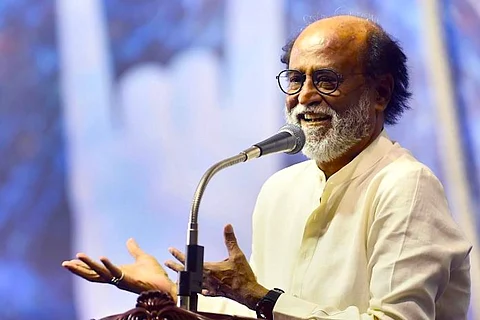

In the last few days, it has been revealed that Superstar and ever aspiring politician Rajinikanth had an ‘oops!’ moment with the Income Tax department some 15 years ago. And while the Income Tax was hell bent on making him pay up some Rs 66 lakh all these years, the case has been withdrawn, and Rajini is presumably debt free as far as the state exchequer is concerned. However, it now appears that around the same time as his misadventures with the I-T department, Rajinikanth also became a self proclaimed money lender.
Mohamed Imranullah S wrote exclusively in The Hindu that Rajinikanth had claimed to be in the ‘money lending business’, according to tax assessment reports that the newspaper has accessed. Apparently, the actor told the I-T department that he lent money to his friends for an interest, and claimed income and losses from this business. Further, he told the I-T department that he was lending money at an interest rate of 18%. However, the Income Tax department, back in 2005, did not accept his claim that this was a business, and suspected that he was only claiming to be a money lender in order to write off ‘bad debts’.
So was Rajinikanth a money lender or not? The actor has not commented on the issue yet, and considering the Income Tax department has decided to withdraw their case against him, we’ll perhaps not get a statement from them either. However, TNM spoke to experts on what it means to be a money lender, as far as tax benefits are concerned. And while these experts cannot comment on what Rajinikanth is or isn’t into, they said that sometimes, ‘money lending’ activities fall in the realm of creative accounting.
A senior chartered accountant, speaking on the condition of anonymity, said, “We do not know the specifics of Rajinikanth’s case of course, but in some cases, when people face losses – either because they gave money to someone personally or for other reasons, they try to offset the loss by calling it a business loss. Basically, if you lose money as an individual, it’s just money you’ve lost. But if you’re a money lender and you’ve lost money, it’s a business loss, that can be accounted for while filing returns.”
“It’s not tax evasion, but could be considered tax avoidance,” another tax expert said, while reiterating that he did not know the specifics in this particular case.
‘18% rate of interest’ triggers row
Meanwhile, the report that Rajinikanth told the Income Tax department he was lending money at an interest rate of 18% has shocked many people, and outraged others. Many people tweeted with #கந்துவட்டி – loosely translating to ‘loan shark Rajini’ – to express their disapproval for the rate of interest supposedly charged by the aspiring politician. Kandhu Vatti, or loans at high rates of interest, is a big issue in Tamil Nadu, where a family of four killed themselves in front of a Collector’s office because they were being troubled by loan sharks.
The reference to Kanthu Vatti meanwhile brought about another hashtag from Rajini’s supporters, who tweeted with #மக்களுக்காக_ரஜினி, or ‘Rajini for the People’.
What the case is about
The Income Tax department in 2004 suspected that Rajinikanth had not declared his full income for the assessment years 2002-03, 2003-04 and 2004-05. In February 2005, they did a survey of his properties, and found that while he had accounted for a lost of costs as his professional costs, less than a tenth of his properties were actually used for his profession.
Further, when the I-T department asked Rajinikanth whether he was in the business of money lending, he initially denied it. Later however, he wrote to the Income Tax department and said he was indeed a money lender, and that he had lent money at an interest rate of 18% as a source of income.
Following the survey, Rajinikanth was forced to file revised returns for the three years in question, and declared a higher income than earlier. But the I-T department contended that since he filed revised returns only after they surveyed him, he should be penalised – an amount of Rs 66 lakh is what the department wanted as a fine. Rajinikanth and his lawyers contested this, and this week, the I-T department has written off the fine amount.
Coincidentally, 2004 was just two years after Baba, the high-budget film, produced by Rajinikanth himself, tanked at the box office. Rajinikanth also took a brief break from acting in its aftermath.